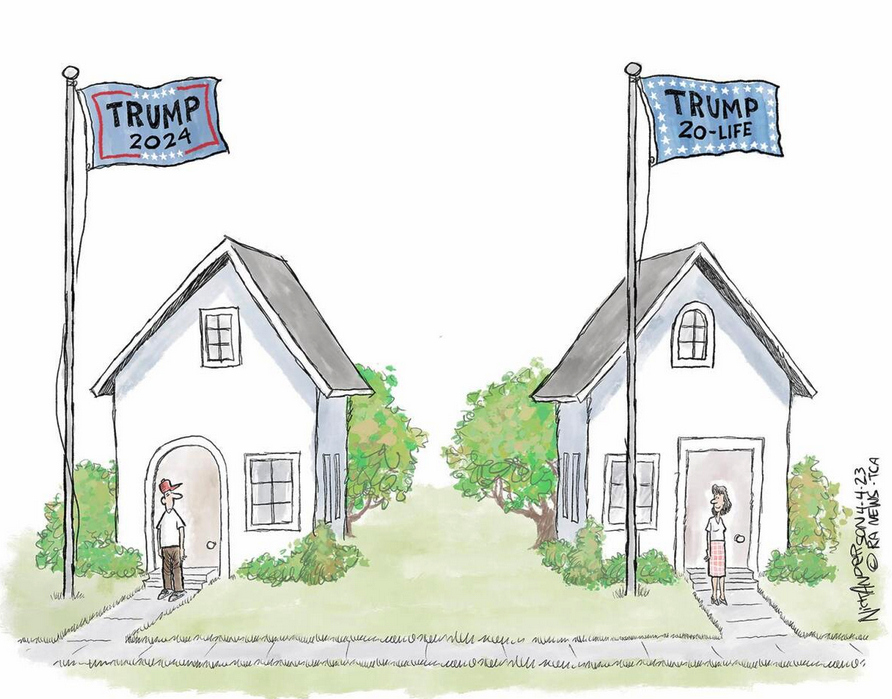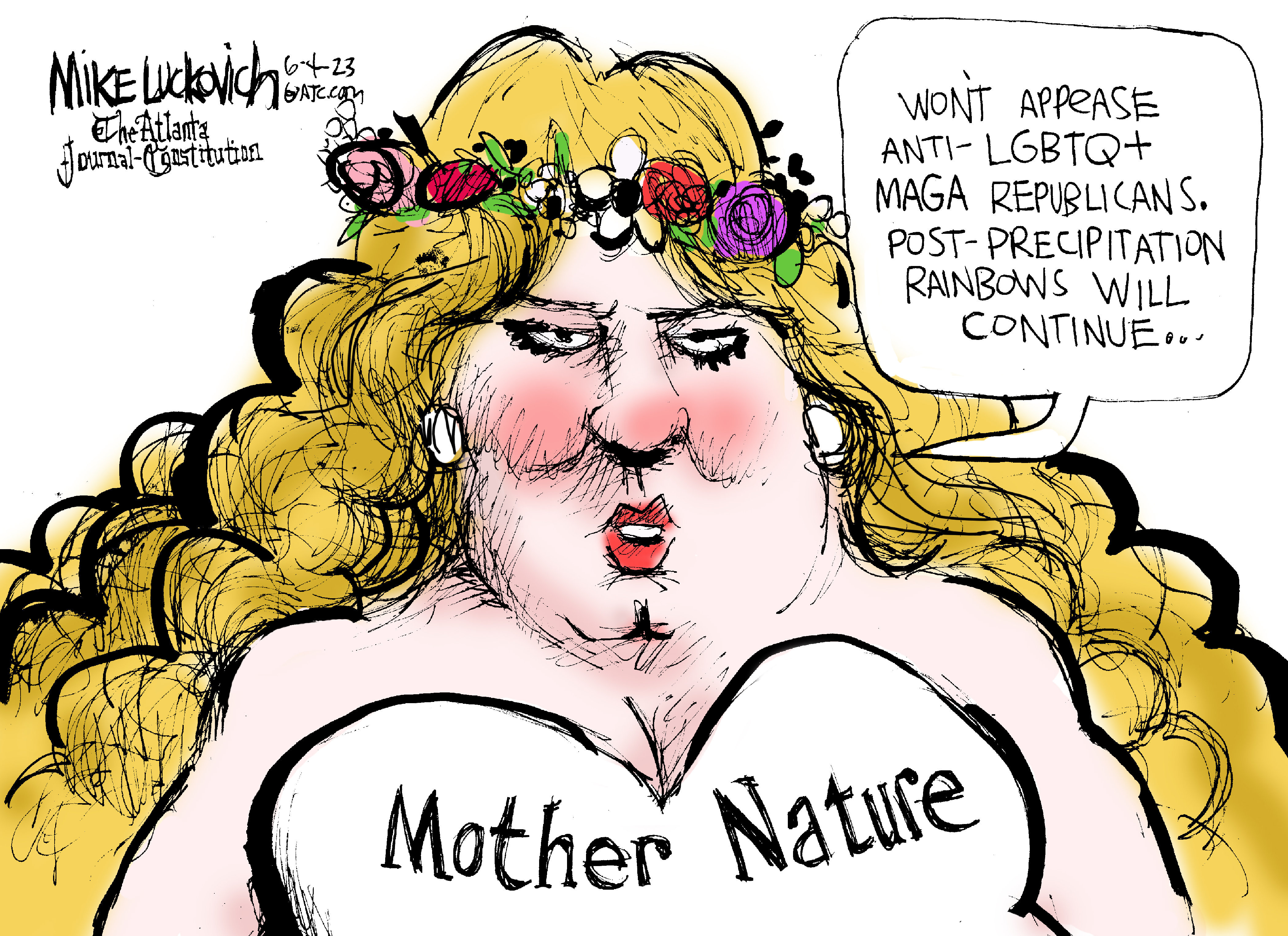It is amazing what you can accomplish if you do not care who gets the credit.
This week's featured post is "Joe Biden is Good at Governing".
This week everybody was talking about the debt ceiling
Saturday, President Biden signed a bill resolving the debt ceiling crisis and pushing the next possible confrontation off to 2025, by which time the American people will have had a chance to weigh in. I discuss this in detail in the featured post.
and the Trump indictment watch

The grand jury considering the Mar-a-Lago documents case last met in early May, prompting speculation that Jack Smith had all the evidence he needed and was now writing an indictment. NBC News claims it's meeting again sometime this week, prompting speculation that Smith has an indictment for the grand jury to approve.
It's not clear whether this indictment would just be about the Mar-a-Lago documents, or also include the more complicated January 6 investigation.
and LGBTQ issues

The Sift usually doesn't take much notice of June as Pride Month, but this year seems different, because the whole concept is under increased right-wing attack. (Target, Bud Light, Kohl's, Starbucks, Lego, Adidas, and North Face are all facing pressure for stocking Pride merchandise or marketing to transfolk.)
I'm straight, cisgender, and -- come next March -- I will have been married to the same woman for 40 years. But from time to time I have attended Pride parades or seen drag shows. I've always found such events uplifting and life-affirming. I've never felt like anyone was telling me I should be gay or trans or anything else. The point is that we can all be what we are, and maybe even what we want to be.
I see LGBTQ Pride as a little like "Black Lives Matter"; it's a response to a negative. So often our society sends the message that Black lives don't matter, or that being anything other than heterosexual is shameful or sinful. Simply saying "I'm not ashamed of what I am" doesn't seem nearly strong enough, so I fully support people expressing pride in themselves.
Friday, a federal judge found that Tennessee's anti-drag-performance law, the Adult Entertainment Act, is unconstitutional.
The 70-page ruling makes dense reading, because most of it discusses technical issues of whether the plaintiff has standing to sue (i.e., must drag performers wait for the law to be enforced first), and what standard of legal scrutiny (strict or intermediate) applies.
But the judge's ruling hangs on a few points that aren't hard to grasp:
- Targeting "male and female impersonators" focuses the law on suppressing a particular viewpoint, rather than the law's ostensible purpose of protecting children. If it's harmful for a child to view some sexually suggestive act, it shouldn't matter whether the actors are portraying characters of their own gender.
- Banning drag performances anywhere that a child "could" be present is both vague and overbroad, because a child could sneak in just about anywhere. The law offers no "affirmative defenses", like "We carded everyone at the door" or "The parents approved."
- The harmful-to-children standard is too broad, given how different five-year-olds are from 17-year-olds.
- The debate in the legislature focused on drag performances, not on harm to children, suggesting that the legislature had the "impermissible purpose" of suppressing drag rather than protecting children.
- The AEA uses text from previous laws, but significantly changes the context: The previous laws targeted businesses that host adult entertainment, while the AEA criminalizes performers. That raises the stakes on First Amendment issues.
Here's the hypothetical example I would have brought up had I been arguing the case: What if a woman does a double impersonation, and pretends to be a male performer in drag? Her drag persona would then match her birth-certificate gender, so her act should be legal under the AEA, even if the audience (and especially any children in the audience) can't tell the difference between her and a male drag performer.
I think a law is very suspect if I don't show my genitalia in a performance, but police have to know what kind of genitalia I have to say whether my act is legal.
People who are worried about drag queens harming children may be looking in the wrong direction. In Texas, a school superintendent was arrested for online solicitation of a minor. He was caught in a sting operation where police officers posed as children aged 13-15.
Meanwhile, a South Carolina youth pastor was arrested for videotaping girls in his church's bathroom.
and you also might be interested in ...
June is the final month of the Supreme Court term. As usually, the big cases are waiting until the end: affirmative action at universities, whether student debt relief is legal, what kind of racial gerrymandering is allowed, and when "religious freedom" trumps anti-discrimination laws, just to name a few.

I can't decide whether to take this graphic at face value. Maybe people really do have a lot fewer friends than they used to. But it's also possible that the definition of friend has gotten stricter over three decades. Suppose I run into someone regularly and have pleasant interactions. Is that a friend, or is more intimacy required? I wonder how my parents would have answered that question, or how many friends they would have claimed to have.
Something cultural makes me take the decline of friendship a little more seriously, though. I'm seeing more and more fantasy series on TV where, when you strip away the supernatural and pseudo-science trappings, the real fantasy is about having friends, in spite of how uncool or fundamentally unlikable you are. Stranger Things is about having friends. Wednesday is about having friends.
Another poll result I don't know how to interpret is the one where college students, especially conservatives, say they censor themselves on campus. Conservative politicians frequently quote such surveys to justify pushing universities to the right, as Ron DeSantis is doing in Florida.
But what does self-censorship mean in this context? If it means "I won't say that I oppose abortion" or "I won't express my doubts about affirmative action", that's concerning, because college students ought to be debating such issues and convincing each other via argument rather than shutting their fellow students up through peer pressure.
OTOH, if self-censorship means "I've stopped saying the N-word", well, that's the virtue known as tact. Mature adults learn to stifle the gratuitous insults that may pop into their minds.
One thing I hope all students are learning is what words other students take offense at. I was in high school before I discovered that Jews took offense at using Jew down to mean bargaining for a lower price. I had to censor myself until I lost the habit of saying it. I was out of college before I learned that gyp (cheating someone) is a slur on the Roma (i.e., Gypsies), or that welshing on a bet insults people from Wales.
The Atlantic writes a lengthy account of how Chris Licht tried to change CNN, and wound up with the debacle of Trump's recent townhall meeting. David Roberts boils Licht's mistake down to one paragraph.
CNN can't be what he wants it to be as long as Trump & the GOP are what they are. It simply doesn't work. You can't report "just the facts" AND have a better relationship with Trump & his base. The two are incommensurate! It simply doesn't work. The right is going to accuse CNN of being biased for the left unless & until it becomes Fox. That's how the right has worked for decades now. You can't report "just the facts" AND escape right-wing accusations of bias.
For reference, the Dominion lawsuit showed us how it works at Fox News. Here's one producer texting another:
We can’t make people think we’ve turned against Trump. Yet also call out the bullshit. You and I see through it. But we have to reassure some in the audience.
If CNN wants to serve that audience, it will have to make the same choice not to call out the "bullshit" the audience wants to believe.
A study just published in the PNAS journal says that police stops of Black drivers that escalate from minor traffic violations to searches, handcuffings, and arrests diverge from other stops in the first few seconds. If the officer's first statement is a command ("Keep your hands on the wheel.") rather than a question or an explanation ("Do you know how fast you were going?"), the encounter is much more likely to escalate, even if the driver is cooperative.
The extreme example here is George Floyd.
We analyzed the first 27 seconds of Floyd's encounter with police on that day. And we found that Floyd apologizes to the officers who stand outside his car window, Floyd requests the reason for the stop, he pleads, he explains, he follows orders, he expresses fear. Yet every response to Floyd is an order.
The study is based on police body-cam videos.
[The researchers] initially set out to look at patterns related to traffic stop escalation for white drivers too, but realized that it happened so infrequently for white drivers that there just weren't sufficient numbers to even include them in the analysis.
The WaPo ordered the same takeout from the same restaurant four times, but did it four ways: through DoorDash, UberEats, GrubHub, and the restaurant itself. It then figured out how much money went to the restaurant, the driver, and the apps.
I found this to be discouraging reading: IMO the apps take way too much of the money, and yet the app companies are all posting losses. Meal delivery looks like an everybody-loses phenomenon.
and let's close with something honest
June is wedding month, so you're going to hear a lot of the same songs you hear at every wedding reception. (Or not. One reception I attended started with "All in Love is Fair", which made me wonder what they were suggesting.) But what if you could change the lyrics to be more honest? The Holderness Family demonstrates.
No comments:
Post a Comment